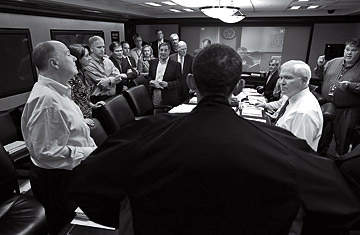
Mission Accomplished. Obama and his team after watching the strike unfold on a live feed from Pakistan.
(2 of 7)
Hard Choices
Fifteen months after Obama's initial "Get bin Laden" order, Panetta returned to the White House in August 2010 with good news. The CIA had discovered a multihouse compound in northeast Pakistan in which bin Laden's favorite courier was living. The compound, which was surrounded by an 18-ft. wall and which Obama's counterterrorism czar John Brennan named the Fortress, was in Abbottabad, a city about as far from Pakistan's capital as Baltimore is from Washington. Abbottabad is also home to Pakistan's leading military academy.
From the moment Panetta appeared, Obama faced four major decisions:
1. When to act? Every day of delay increased the likelihood that bin Laden, if he was actually there, would escape. A leak in Washington that popped up on a blog or in the press would sound an alarm, causing him to flee.
2. Who to include in the decisionmaking? Adding more people would reduce the chances that important dimensions of the operation would go unexamined. But every additional pair of eyes came with a mouth that could be the source of a leak.
3. How, exactly, to capture or kill bin Laden? Obama's menu had four entres: Predator drones with Hellfire missiles delivering 500-lb. bombs (like those used five months later to kill Anwar al-Awlaki in Yemen); B-2 bombers with 2,000-lb. laser-guided bombs (like those used in late 2011 against Muammar Gaddafi in Libya); special forces on the ground; and a joint military operation with Pakistan.
4. Though this was first and foremost a matter of national security, any decision would have political consequences. Everyone involved knew Obama was "betting his presidency" on this issue, as a Deputy National Security Adviser put it. If Obama waited and OBL escaped, Obama would be savaged for fiddling while public enemy No. 1 vanished. If he acted and the operation failed, opponents would tar him as a second Jimmy Carter, recalling the failed 1980 attempt to rescue Americans held hostage in Iran.
The biggest surprise of the entire operation was that it was a surprise. A half-century ago, when the CIA discovered that the Soviet Union was sneaking nuclear-tipped missiles into Cuba at the start of what became the Cuban missile crisis, one of the first questions President John F. Kennedy asked was, How long until this leaks? His National Security Adviser thought a week at most. So JFK gave himself five days to deliberate, review the evidence, listen to counterarguments and change his mind more than once. As he noted afterward, if he had been forced to make a decision in the first 48 hours, he would have chosen an air strike on the missile sites rather than the naval blockade he eventually selected. That air strike could have led to nuclear war.
